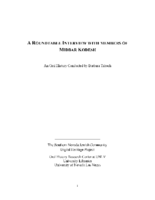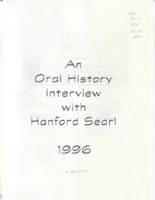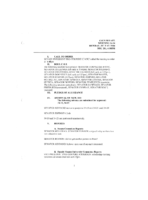Search the Special Collections and Archives Portal
Search Results

Transcript of interview with Arne Rosencrantz by Claytee White, February 9, 2010
Date
Archival Collection
Description
In this interview, focused on the John S. Park neighborhood of Las Vegas, Arne Rosencrantz discusses his childhood growing up in Las Vegas. He talks about local businesses, including his father's furniture store, as well as schools and churches in the neighborhood.
Arne Rosencrantz remembers living on Beverly Way from 1954 to 1970. Like so many others from that era, he attended Fifth Street School, John S. Park Elementary School, John C. Fremont Middle School and graduated from Las Vegas High School. As a Jew, he was in a small minority, but fondly recalls growing up in the dense Mormon population of John S. Park Neighborhood. As a youngster, life in Las Vegas was filled with fun. The desert provided opportunity to hunt lizards and rabbits. Kids walked to school without concern. They played ball and found the Strip casinos welcoming to locals. He tells how the social issue of segregation of the 1960s did not affect him personally, but how local movie theatre owner Lloyd Katz fought to make his Huntridge and Fremont theatres integrated. He also reminisces about his father opening Hollywood Furniture and later Garrett's Furniture, which Arne operated until retiring in 2001. During the interview, he lists other furniture companies and the strong assortment of other retailers and restaurants that served the neighborhood.
Text

Transcript of roundtable interview with members of Midbar Kodesh, April 19, 2015
Date
Archival Collection
Description
In this interview, members of Midbar Kodesh discuss how they each became involved in the synagogue, and how the congregation formed in the mid-1990s. Some of the narrators grew up in Las Vegas and talk about the growth of the town and being former members of Temple Beth Sholom.
Text

Transcript of interview with Andrew and Debbie Levy by Barbara Tabach, September 12, 2016
Date
Archival Collection
Description
Andrew (Drew) Levy was born and raised in Las Vegas, Nevada, where his family became prominent civic and real estate leaders. His grandfather was Harry Levy, a former Las Vegas City Commissioner, and his father Alvin Levy was a former councilman. Drew is always proud to say that he never left Las Vegas and of partnering with his father in the Levy Realty Company. While growing up, Drew it was easy for a teenager to enjoy the perks that could accompany his family?s civic persona?such as casino shows, events and meeting early Las Vegas casino executives like Moe Dalitz. After graduation from Clark High School, Drew attended Arizona State University. It was in Tempe that he met Debbie Cheek, his future wife. When Debbie arrived in Las Vegas, she enrolled at the University of Nevada, Las Vegas, where she finished her degree and started her accounting practice. She ran her business for ten years before opening Art Starts Here, an art school. In the 1990s, Debbie?s passion for art led her to be involved in the creation of First Friday, a local monthly art festival. She also teaches a summer art camp for the Adelson Educational Campus. Drew and Debbie became deeply involved in the many Jewish congregations in Las Vegas. Blossoming first at Temple Beth Sholom where they were married in 1980, Debbie sat on the preschool board and oversaw the temple board, while Drew was the advisor for the youth group. The couple later joined Congregation Ner Tamid where Drew was congregation president from 1999 to 2000 and Debbie was board treasurer in 2001. Debbie includes stories of her conversion to Judaism and keeping kosher. In this interview, Drew and Debbie Levy reflect on changes they see in Las Vegas, from when Drew was a kid to the times they raised their own daughters, Sarah and Jenna, here. Looking at the larger picture of the city, they describe booms in the real estate market and growth in the artistic and cultural aspects of Las Vegas. They provide a perspective of the growth of the local Jewish community.
Text

Transcript of interview with Bruce Isaacson by Barbara Tabach, March 24, 2017
Date
Archival Collection
Description
Bruce Isaacson was born in 1956 in Castro Valley, California to Betty Griffin and Bernard Isaacson, and spent his childhood in Oakland. He received his bachelor?s degree from Claremont McKenna College with majors in economics as well as drama, and continued studying for his Masters of Business Administration at Dartmouth College. After receiving his MBA, Isaacson started a career in finance, focusing on mergers and acquisitions. In 1995, he moved to Las Vegas to pursue a real estate career alongside his father. In June 2015, Isaacson became Clark Country?s first poet laureate to encourage poetry as an art form in Southern Nevada. Although Isaacson began writing poetry at a young age, he wanted to develop his craft further. So he attended Brooklyn College for a Masters of Fine Arts and studied with famed poet Allen Ginsberg. Isaacson is known in the San Francisco Bay Area as organizer and poet in the Cafe Babar readings in the 1980s. He is also a co-founder of Zeitgeist Press, where he remains publisher and co-editor. In this interview, Isaacson discusses his childhood and how he maneuvered his career path from finance into poetry. He talks about applying for and serving as the county?s first poet laureate, and describes the programing he?s started in this capacity. Isaacson also speaks about his earlier involvement with Bay Area poetry scene as well as the impact of his Jewish upbringing on his life and his art.
Text

Transcript of interview with Murl Emery by James M. Greene, October 18, 1974
Date
Archival Collection
Description
On October 18, 1974, James M. Greene interviewed Murl Emery (born June 7th, 1903 in Bolton, California) at his home in Nelson, Nevada. Also present during the interview is Mrs. Emery and Mr. Dutch Eckhart, a guest who has just arrived to visit with Mr. Emery. The interview covers Mr. Emery’s personal experience in and around Southern Nevada, particularly in the areas from Searchlight, Nevada to Nelson, to Boulder Canyon, but mostly on the Colorado River. Mr. Eckhart also helps to interject some insight into the popularity of the Model T Ford in those days and early days of newly paved roads. Additionally, they discuss water shortage, wells, the building of the railroad, and mining in Nevada. Mr. Emery also discusses the books that were written about his adventurous life, his discoveries and his explorations.
Text

Transcript of interview with Lyle and Mary Ann "Timbuck" Rivera by Claytee White, May 1, 2009
Date
Archival Collection
Description
The oral history interview of Lyle and Mary Ann "Timbuck" Rivera begins with the 1915 birth of Frances McNamee, Timbuck's mother, who had the distinction of being the eleventh baby born in early Las Vegas. Frances' father and grandfather who were attorneys for the railroad arrived in 1905 and became part of the historical roots of the community. Timbuck's memories also include landmarks and activities that were integral to the growing town, such as her mother's involvement in organizing the Junior League. Lyle Rivera, a relative newcomer, arrived in the 1940s and experienced what he describes as a life of "bouncing around" and being the only child of a single mother, a cocktail waitress at the Golden Nugget. Lyle would grow to distinguish himself within the community as a lawyer and community activist. He modestly mentions his achievements which included involvement with the UNLV Foundation, professional careers in both the Attorney General's and District Attorney's offices,
Text

Transcript of interview with Hanford Searl by Dennis McBride, November 2, 1996
Date
Archival Collection
Description
Dennis McBride interviews Hanford Searl about a number of things: his being gay, his being gay in Las Vegas and other places, religious issues. Also, some information about working at the Las Vegas Review-Journal, and for Bob Brown at the Las Vegas Valley Times.
Text

Interview with Thornton Duard (T.D.) Barnes, January 12, 2007
Date
Archival Collection
Description
Text

Interview with Gay (Gertrud Anne Yoder) Kauffman, October 11, 2006
Date
Archival Collection
Description
Access note: Audio temporarily sealed
Text

Meeting minutes for Consolidated Student Senate, University of Nevada, Las Vegas, July 12, 2004
Date
Archival Collection
Description
Text
